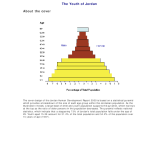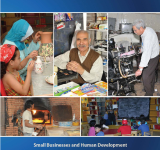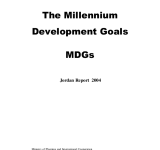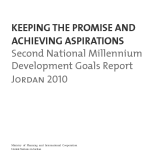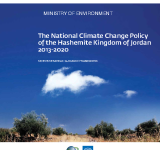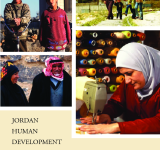In 2006;; the Sultanate of Oman undertook a project that aimed to support the implementation of the country’s vision towards conservation of biological diversity in the Sultanate of Oman. This report serves as an “evaluation and assessment of capacity building in the field of traditional knowledge related to biodiversity.” The report aims to describe the state of traditional knowledge on biodiversity in Oman;; assess capacity-building requirements in relation to traditional knowledge;; and provide a set of recommendations with a strategy for the protection and maintenance of traditional knowledge on biodiversity conservation. Various topics related to biodiversity are covered;; including irrigation;; tree cultivation;; crop improvement;; livestock management;; and soil and water conservation. The methodology used depends on three sources of information;; including a review of secondary data;; in-depth interviews;; and a participatory workshop.
والاستدامة
This first Jordanian National Human Development Report focuses on the condition and role of young people in the country;; arguing that the capacity of young Jordanians to contribute to national development and to compete in the global economy will determine whether Jordan remains a low middle income country or joins the ranks of the world's advanced economies. The Report looks at young people's lives and aspirations in the three key areas of education;; employment and social integration;; finding for example that 60% of all unemployed people are below that age of 25. The Report concludes that although Jordan has made significant advances in building people's capabilities;; there is room for improvement in aspects of gender-equality;; employment;; income and quality and relevance of education;; and ends with a substantial section on policy recommendations suggesting strategies for addressing this shortfall
This report explores the role of Small and Medium-Enterprises (SME);; as an agent for sustainable human development in Jordan. It analyzes SMEs and their contribution to human development using fours key central pillars of human development;; namely: economic growth that is equitable and pro-poor;; social progress;; participation and empowerment through micro finance;; and environmental sustainability. The report analyses the link between SMEs and empowerment or lack thereof;; with a specific focus on the two issues of employment;; as a tool for empowerment;; and the capacity of SMEs to enhance the position of women within the workforce and home. The report findings were based on extensive research;; a survey of 1;;500 firms and focus groups discussions conducted across the governorates of Jordan. The report proposed general recommendations in terms of institutional coordination;; exports;; cluster groups;; quality standard;; government monitoring;; tax law;; local development;; youth empowerment and the increase of minimum wage.
The Millenium Development Goals Report has been prepared through the active participation of the Jordanian Government and the UN Country Team. As scorekeeper of the MDGs;; UNDP supported the Ministry of Planning and International Cooperation in this joint endeavor. The objectives of this report are to create a baseline situation;; monitor progresses made to date;; and indicate what should be done in order to achieve the MDGs. The concluding section of fostering global cooperation gives an overview of national efforts to strengthen the basis and improve the environment for developing strong partnerships to achieve macroeconomic stability and other important national objectives.
Jordan’s second Millennium Development Goals Report 2010 shows the extent to which progress has been made towards achieving those targets and highlights the challenges that still confront the country to achieve these goals. The report seeks to identify the policies required for meeting the MDG targets by the year 2015;; at a time when the United Nations and the World’s governments are exerting a collective effort to review the progress achieved to date and identify the obstacles standing in the way of meeting the goals and targets by 2015.
Jordan faces potential serious impacts on its natural ecosystems;; on its river basins and watersheds;; on biodiversity—then cascading to impacts on food productivity;; water resources;; human health;; public infrastructure;; and human settlements. Climate change will have serious implications on the country’s efforts to eradicate poverty and realize sustainable development for current and future generations— ultimately making climate change an issue of intergenerational equity. Climate change scenarios indicate that Jordan and the Middle East could suffer from reduced agricultural productivity and water availability among other negative impacts. At the same time;; a substantial potential for cost-effective reduction of GHG emissions exists in Jordan. The Policy will provide an overarching (umbrella/high level) guidance for the Government of Jordan to implement the major climate change objectives of national priority related to adaptation and mitigation of GHG emissions
Many reports talk about poverty and the poor;; but few actually provide the space for the poor themselves to take centre stage and to talk about their lives. Jordan’s second National Human Development Report redresses this imbalance. It places the poor at the centre of analysis and attempts to capture the diverse and dynamic characteristics of poverty through the eyes of the poor themselves. A major theme of the report is that the considerable human development gains that have been achieved at the macro-level in Jordan have yet to trickle down to many sub-groups among the poor. The report provides detailed recommendations to accelerate this process and to enhance positive outcomes for the poor.

